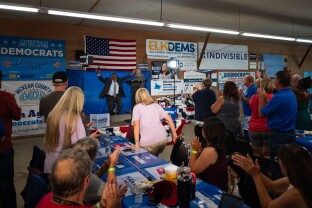Vice President Kamala Harris won’t come close to winning in Jefferson County, a rural area tucked in the middle of Pennsylvania that has only voted for a Democratic presidential candidate once in its history.
Yet the hundreds of Democrats who descended on the county fairgrounds recently couldn’t feel more at home.
They gathered for Demstock, the annual part-therapy, part-campout, part-strategy session over two days at the end of August. County and regional leaders made connections and traded suggestions for getting out the vote in places where they say it’s not only isolating to be a Democrat but dangerous.
